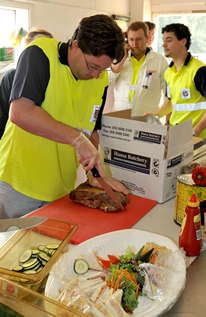Watch this space for installments of Hansa's quarterly newsletter, "Off Cuts", as well as news, information and other exciting developments as they occur.
News
August 2011

It’s time to experience the quality of the Providores Choice selection
At the Providores Choice we supply our customers with a range of premium quality products sourced and manufactured by some of Australia’s and the world’s finest producers.
Our partnerships with some of the most respected names in the food industry has lead to our premiere product release, with a distinct focus on smallgoods. These products are made using only the finest authentic imported European spices and seasonings, and using only the highest quality Australian meats.
Portion and packet sizes have been designed for retail / single use.
Make sure that you sign up for our newsletter and visit our site regularly to keep up to date with our ever increasing variety of produce…
Stay tuned for more news regarding this exciting brand soon to be released upon the market of the finest smallgoods and delicacies available.........
December 1, 2010
Building Plains Paddock brand

Brand on the run: Plains Paddock's Anna Kelly at the Hay sheep sale recently, where she paid $121 for 120 first-cross Dorper ewe lambs to complement her branded lamb venture.
THE Dorper has proved the perfect plank for Deniliquin NSW sisters, Anna Kelly and Jane Thomson, to build their Plains Paddock lamb brand. The duo began Plains Paddock four years ago and now supply top Melbourne restaurants such as The European, Circa the Prince, Cumulus Inc., St Judes Cellars and Next Door Diner.Their chemical and hormone-free lamb, raised on their properties southwest of Deniliquin, sells for up to $170 a carcass, depending on weight, delivered direct to the chef.
"Chefs like the succulence, fat coverage and flavour of the Dorper and they also like dealing with the farmer. I'm not afraid to walk into a kitchen," Anna said.
The brand began when a friend (and chef) suggested Anna, then home on the family farm, develop a Dorper-based brand and sell it direct to satisfy a growing demand - and achieve a better margin."I went back to Mum and Dad's farm to help out during the drought and Dorpers seemed to fit in, and they could do well on pretty much nothing," she said.
Although the right contacts in the food industry certainly helped in getting chefs to sample the product, Anna knew having consistent supply of a quality product and a story behind that product were essential for branded marketing."If you can tell a story about your product, you can attract more for it," she said.Anna said chefs appreciated the Dorper for its richer flavour and more delicate texture.
Since starting with a flock of just 16 ewes - all the first lambs went into samples - Anna and Jane have grown their flock to 3000 Dorper and Dorper-Merino ewes to ensure a continual supply of wether lambs to restaurants.
"We do not supplementary feed as that gains weight but not flavour; rather we rotate grazing paddocks carefully to ensure prime-quality pastures are always available to the mothers," Anna said.
"The lambs put on size and weight quickly due to low stocking rates and our emphasis on good low-stress husbandry practices."This low-input approach also ensures the sisters can guarantee supply under almost any conditions.
About 20 to 30 lambs are handpicked for the brand each week, depending on the restaurants' requirements. Carcasses are hung to age for seven to 10 days."Some restaurants request lambs that dress out at 8kg, which is a very young lamb and they're hard to catch at that weight; others want a larger lamb at 22kg dressed," Anna said.
"We've staggered joining over the two properties to fulfil the different needs and keep up supply."Dorpers, with a propensity for multiple births, also allow Plains Paddock to take one lamb off the mother to dress out at 8kg. This also helps to prevent mastitis and ewe stress."We don't use dogs, everything is done gently," Anna said.
"We take the lambs to the abattoir as late as we can in the afternoon; they come off their mothers and then straight into the trailers and are killed early the next morning, meaning they are off feed and water for no more than about 12 hours."And the fact they very rarely get fly struck means that it fits in with our organic practices."Although still in the "small time" - the properties also produce wheat, canola and barley - the girls from Plains Paddock are fast approaching the day when they can't keep up with demand.
It's reward for effort and having faith in the product."I sell the whole carcass only and a lot of chefs are happy with that; they love breaking the animal down themselves and taking the time to understand how the animal works," Anna said.
She said the popularity of the brand had also opened the door to explore 21-day dry-aged Dorper hogget. "Even better and more flavoursome than the lamb, with a sweet nutty taste to the fat, being able to hang Dorper hogget meat it in a similar fashion to beef enables the muscle and sinew to break down and tenderise," she said.
But having a brand dedicated to Dorpers, sometimes leaves them exposed to the whims of the replacement ewe market.
"It's always easier to chase the big dollars at saleyards, but I believe in what I'm doing and I like the idea of my own sheep going that way (into the brand) and being appreciated," Anna said.
Off Cuts 3rd Edition 2009 - Spring
Off Cuts 2nd Edition 2009 - Winter
Off Cuts 1st Edition 2009 - Autumn
April 2009
Meat Standards Australia (MSA) Workshop
‘Red Meat Eating Quality’
6.00pm - Tuesday 26th May 2009 Sud Restaurant Two, 299 Toorak Road, South Yarra
Thanks to all who attended - it was a great night had by all!
| February 2009 | |
 |
Andrew Wilson of the Salvation Army prepare meals for the fire crews at the Whittlesea staging ground, some 50km north of Melbourne on February 13, 2009. The wildfires, which started on February 7, have become the deadliest in Australia's history leaving not only at least 181 men, women and children dead, but destroyed over 1800 houses and left over 7,000 people homeless. AFP PHOTO/Paul CROCK |
